Kulen, Prosciutto and Olive Oil Most Recognizable Croatian Products
January 5, 2022 - Key ingredients of the Mediterranean diet are becoming the most recognizable Croatian products in the world.
The pandemic and stagnation in the world market have further emphasized the need for Croatia to focus on its food production. This is especially true for meat and meat products. Nevertheless, the potential certainly exists because according to the calculation of the Faculty of Agriculture in Zagreb, in 2018, the self-sufficiency of the Republic of Croatia in meat production amounted to 70.64%, reports T.portal.
Croatian Member of the European Parliament and negotiator of the EPP Group for the Committee Opinion on the Internal Market and Consumer Protection on the 'Field to Table' Strategy, Tomislav Sokol, managed to fight for the protection of traditional Croatian products such as kulen and prosciutto.
"The European Union is determined to make the food system healthier and more sustainable. This does not mean giving up our traditional meat products such as Slavonian kulen and Istrian or Dalmatian prosciutto. Moreover, I am sure that our products, known for their top quality and traditional production methods, do not threaten citizens' health. As a member of the Committee on the Internal Market and Consumer Protection, and as a rapporteur for European citizens, I intervened in the text of the Opinion on the European Commission's Field-to-Table Strategy to protect the production of traditional Croatian products," says Tomislav Sokol.
Croatia has significant production potential in this sector, which opens new economic and development perspectives, especially for the Croatian countryside. Europe must become self-sufficient in producing quality and healthy food, and Croatian agriculture and the food industry must be integral elements of this system.
Sokol ensured that the Mediterranean diet does not qualify as unhealthy in that Strategy. Namely, other political groups in the European Parliament agreed on the text of the Opinion, which would label European, and thus the Mediterranean diet, unhealthy. However, during the negotiations on the specific amendment, Sokol insisted on changing the text of this act, which would mark the European and Mediterranean diet as unhealthy.
"I must admit that I was quite surprised when I noticed in the text that our diet was to be declared unhealthy. Flat and unfounded claims must not occupy space in official documents of the European Parliament. From the beginning, I was clear in my position, and I am glad that I was able to convince other fellow Members of my position. We are proud of our Mediterranean lifestyle and diet that includes the use of fresh foods, fish, fruits and vegetables, and essential olive oil," explains Sokol.
It should be reminded that the 'Field to Table' Strategy defines key priorities for setting up a sustainable and healthy food system, and the fact that the Action Plan accompanying the Strategy envisages the adoption of 27 legislative and non-legislative acts until 2024 shows how complex the implementation of this Strategy will be.
To read more about lifestyle in Croatia, follow TCN's dedicated page.
Protected Croatian Products Safe from Grey Economy with Higher Prices
March the 4th, 2021 - Protected Croatian products are worth paying that bit more for, and the public are growing more and more aware of the need to fork out a few kuna more in order to keep such products protected from the clutches of the grey economy.
As Poslovni Dnevnik/Marta Duic writes, this year, more precisely until the end of February, three new names of protected Croatian products were registered at the level of the European Union - Rudarska greblica, Dalmatinska pecenica and Dalmatinska panceta.
Thus, Croatia, as the youngest member state of the EU, is in ninth place in terms of the number of registered names of domestic agricultural and food products, and the first on the list of protected Croatian products to receive the label was Krk´s much loved prosciutto. How much this label helps when it comes to actual product placement and the penetration of foreign markets was discovered by the manufacturers themselves.
"We also have an additional fifteen products that we´ve protected at the national level and are in preparation for the procedure or are already in the process of registration at the EU level, and six more products for which the national protection procedure is underway.
By protecting the name, manufacturers protect the reputation of their product from misuse and damage, and it is this sign that guarantees the consumer the purchase of an authentic and controlled product which boasts proper recognised quality and is of local origin. The recognisability of a product is connected with the recognisability of the area where it is produced, which contributes to the strengthening of the tourist offer, but also to the sustainable development of rural areas.
The importance of registration and protection also lies in the fact that it ensures classification into a higher price category, which for the manufacturer means better market positioning and of course - higher income.
According to the European Commission (EC), these products fetch an average of 2.3 times more in terms of price than a similar unlabelled product, and according to a survey conducted by the ministry on more than fifty certified manufacturers, as many as 68 percent of manufacturers have noticed an increase in demand for their product since they have become proud bearers of such a label,¨ they point out from the Ministry of Agriculture.
Ante Madir, executive director of the Croatian Prosciutto Cluster, explained that precisely because of the sensory properties and specific traditional production technology, Croatian prosciutto has a great export potential and potential for placement via tourism through the country´s already very rich gastronomic offer.
As he says, through the Croatian Prosciutto Cluster and various prosciutto associations, they promote these protected Croatian products, every year in another city they organise Croatian Prosciutto Days focused exclusively on protected prosciutto, and representatives of the Cluster participate in all specialised fairs across the country and abroad.
"EU labels of protected geographical origin, which are carried by Krk, Drnis and Dalmatian prosciutto, and the label of originality boasted by Istrian prosciutto, are a guarantee of quality and are increasingly recognised by local customers. Foreign tourists have long been aware of what is involved when it comes to such labels, they know the difference and always put quality before price.
Designations of protected geographical origin and originality are important not only for their recognisability, but they also have the function of protection against the clutches of the grey market. Here in Croatia, the production of prosciutto is growing from year to year, but this is not enough to cover its consumption.
Specifically, we eat about a million pieces of prosciutto a year, and we produce about 450,000 pieces of it. The growth of production was not stopped by the coronavirus pandemic, but, unfortunately, it slowed things down in terms of placement. Tourism suffered because of the pandemic, and tourism is otherwise the best opportunity for the placement of Croatian prosciutto caused a decline in sales.
When it comes to exports, we have a trend of increasing sales of our prosciutto in the EU. Some prosciutto companies in foreign markets had an increase in sales in 2020, regardless of the pandemic, up to even 30 percent more when compared to 2019," said Madir.
¨Croatia exports its prosciutto to all countries in the immediate region, but also to those countries where the Croatian diaspora live, such as Austria and Germany. At the end of last year, one Croatian prosciutto company exported the first quantities of prosciutto to Ukraine. We also had exports to New Zealand and Hong Kong.
Croatian prosciutto is sold in Serbia, Northern Macedonia, and Bosnia and Herzegovina. The Association of Dalmatian Prosciutto Producers prepared the documentation and applied for the tender M3.2.1-2, for support for information and promotion activities. If the funds are obtained through a tender, then we will use them for the promotion and recognition of prosciutto as a protected EU product,¨ added Madir.
One of the producers of protected Croatian prosciutto, more precisely the Dalmatian type, is Vlade Prancic, and his facility annually produces about a hundred tonnes of prosciutto. As he says, in this ongoing pandemic crisis, sales have dropped by twenty percent, but he believes that quality products always find their way to the customer, so he remains optimistic about the future.
"When it comes to protected Croatian products, local customers are increasingly aware and it is not a problem for them to spend a little more money on such products. On the other hand, buyers in foreign markets such as Germany or Austria, have long recognised the quality of protected products and this is our only chance given that the quantity Croatia has can quite simply not compete with Spanish and Italian manufacturers.
We sell our prosciutto almost 75 percent of our production through the HoReCa sector throughout Croatia, and our exports grow from year to year, so 25 percent of our total production goes off to Germany, Austria, Slovenia and the Czech Republic. Events, such as Croatian Prosciutto Day, contribute to the branding of protected Croatian products, but that is not enough.
Most producers are small family prosciutto manufacturers, they are masters of prosciutto, but not for marketing and branding, so in the promotion of protected Croatian products, we really need the help of our state institutions and continuous campaigns that would educate customers and other producers,¨ said Prancic.
According to several published studies related to various European Union trademarks, consumers are more aware of trademarks from southern Europe, and the reason for this may lie in the fact that Italy, France and Spain have around 700 protected products to boast of. The experience we have from 2020 has shown us the importance of domestic production in all segments.
For the latest travel info, bookmark our main travel info article, which is updated daily.
Read the Croatian Travel Update in your language - now available in 24 languages.
Six of the Best! Croatian Protected Produce On Sale in China
September 18, 2020 – Six items of Croatian protected produce are among the 100 European items to go on sale in China
Six items of Croatian protected produce are among the 100 European items to go on sale in China. In a reciprocal deal, 100 Chinese products will also be recognised and recommended on the European market.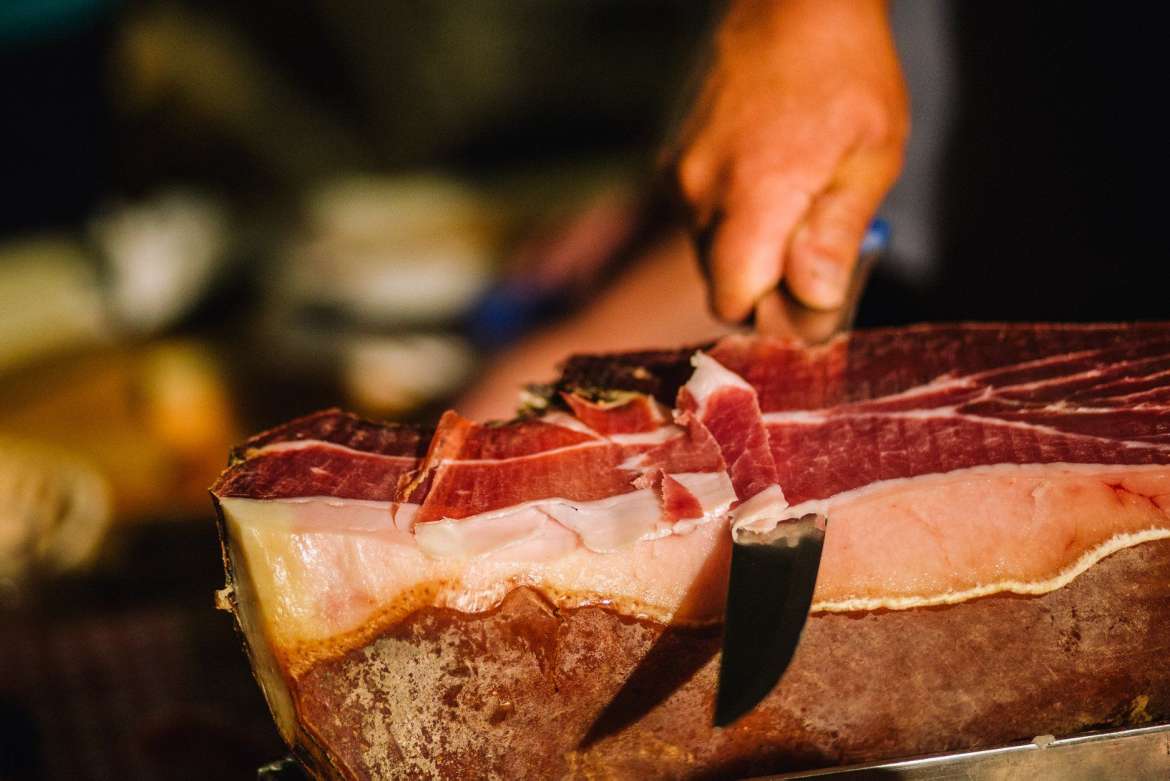 Dalmatian prosciutto © TZ Vrgorac
Dalmatian prosciutto © TZ Vrgorac
Baranja kulen, Dalmatian prosciutto, Drniš prosciutto, Lika potatoes, Dingač wine and Neretva mandarins are the premium six Croatian protected produce chosen to be among the European 100. All of the Croatian protected produce is already recognised at a national and at an EU-level and designated its status based on its unique place of origin.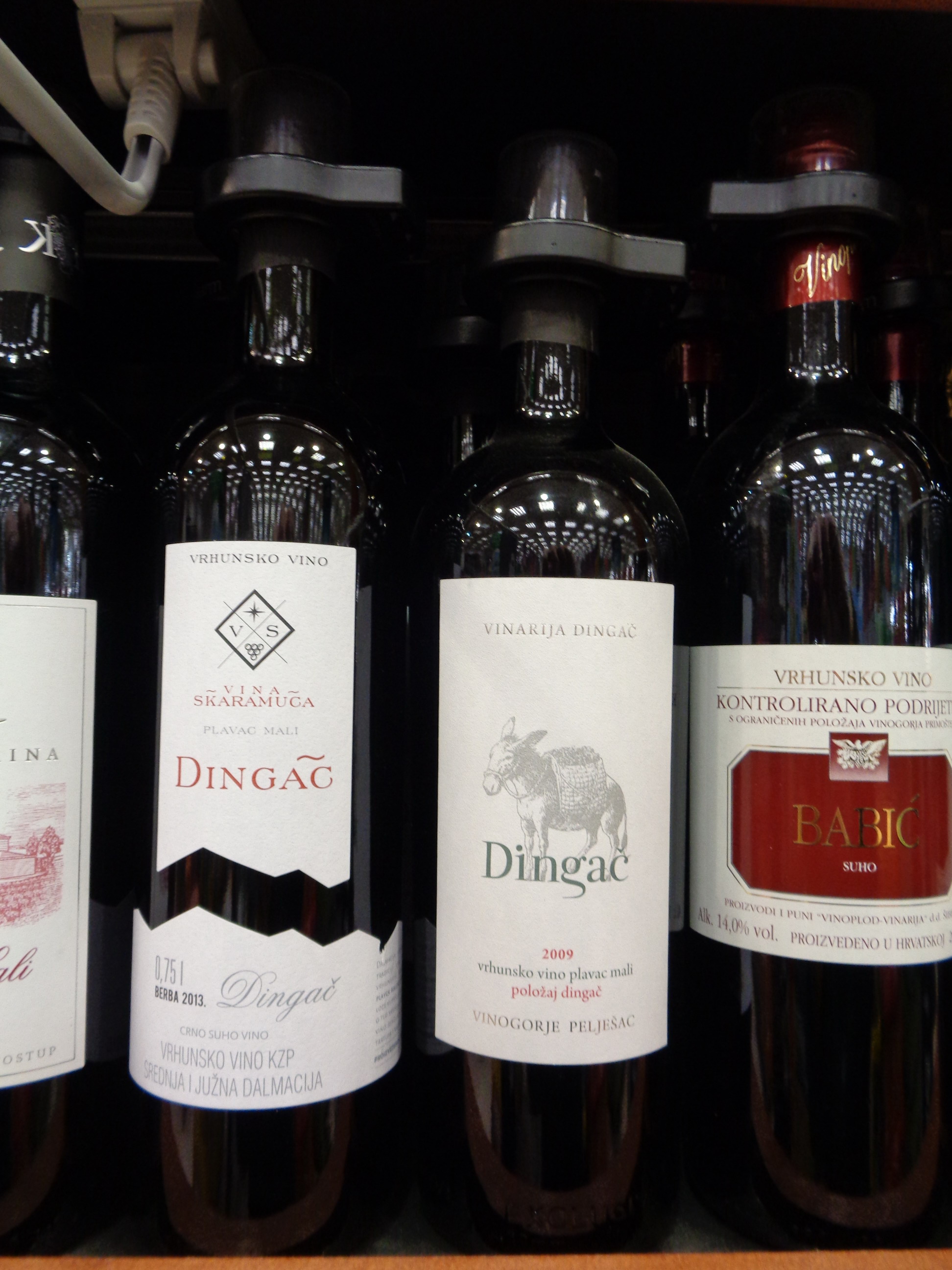 Dingač wine © Silverije
Dingač wine © Silverije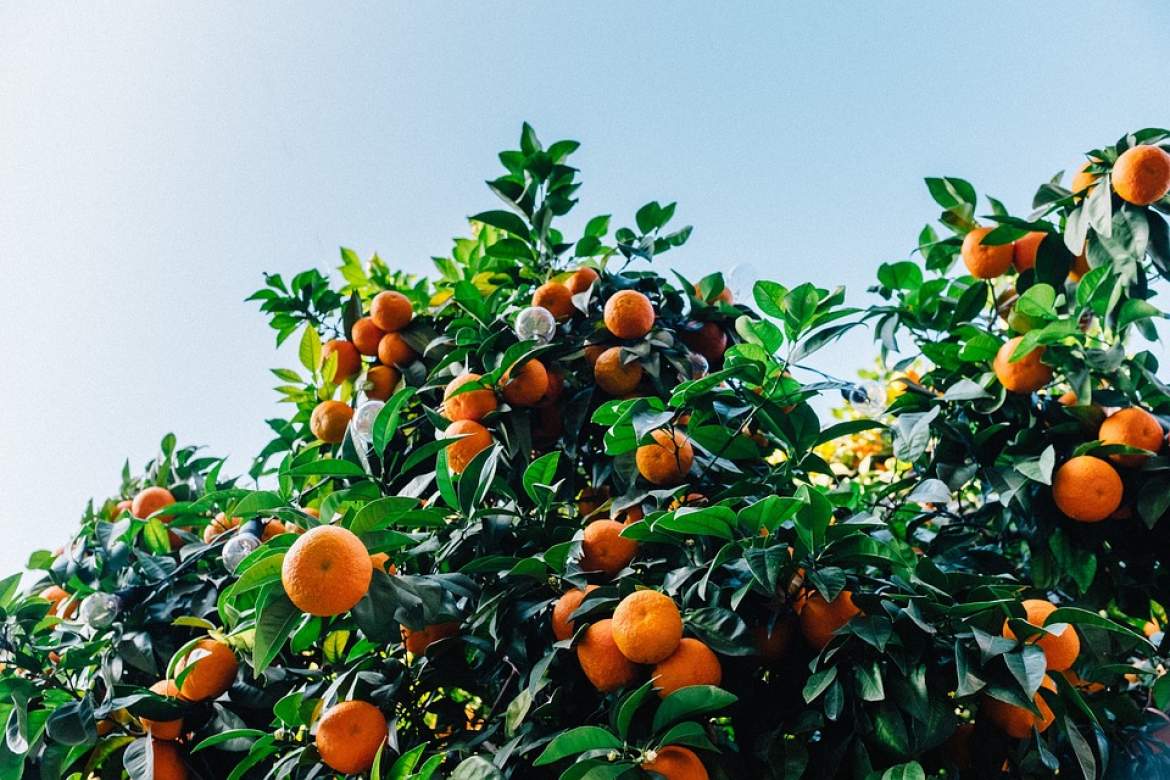 Neretva Mandarins
Neretva Mandarins
The European products will be specially marked and receive special privileges when they go on sale in China. Alongside the Croatian protected produce, other items on the European list are French champagne, Greek feta cheese, Italian Parma prosciutto, Italian mozzarella, Irish whiskey and Portuguese port. On the Chinese list of products are distinct varieties of rice, bean and vegetable products, some of which will already be popular with Europeans who eat or cook Chinese cuisine.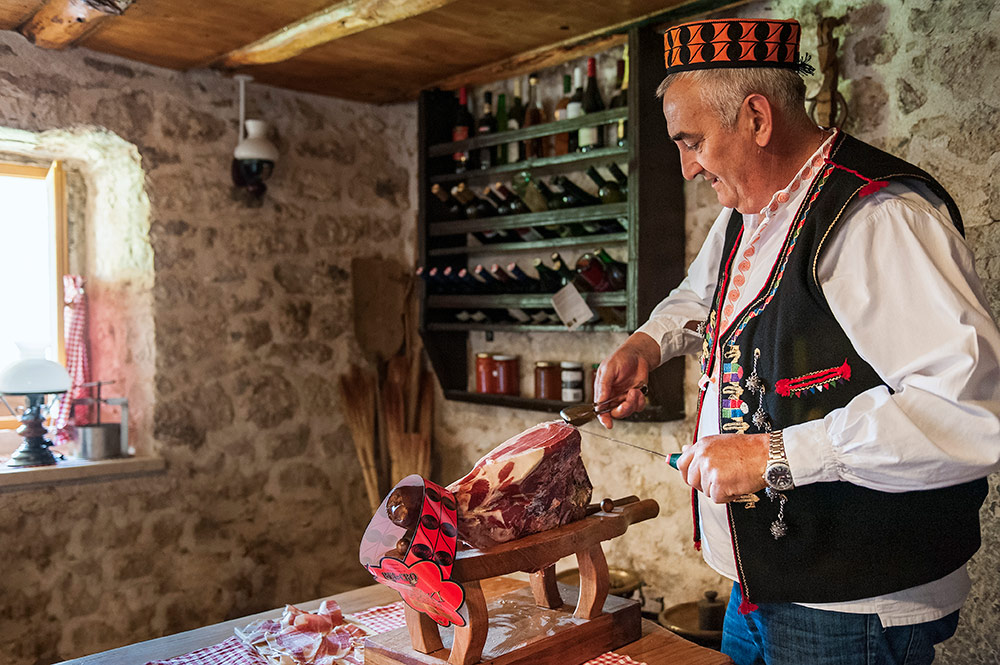 Drniš prosciutto © Tourist Board of Drniš
Drniš prosciutto © Tourist Board of Drniš
The full list of Croatian produce protected at an EU-level currently includes Istrian olive oil, Dalmatian prosciutto, Pag cheese, Lika lamb, Poljički Soparnik, Zagorje turkey, Korčula olive oil, Istrian prosciutto, Sour cabbage from Ogulin, Neretva mandarins, Slavonian honey, Drniš prosciutto, Cres olive oil, Pag salt, Baranja kulen, Bjelovarski kvargl, Varaždin cabbage, Pag lamb, Šolta olive oil, Meso 'z tiblice, Zagorje mlinci, Krk prosciutto, Lika potatoes, Slavonian kulen, Krk olive oil.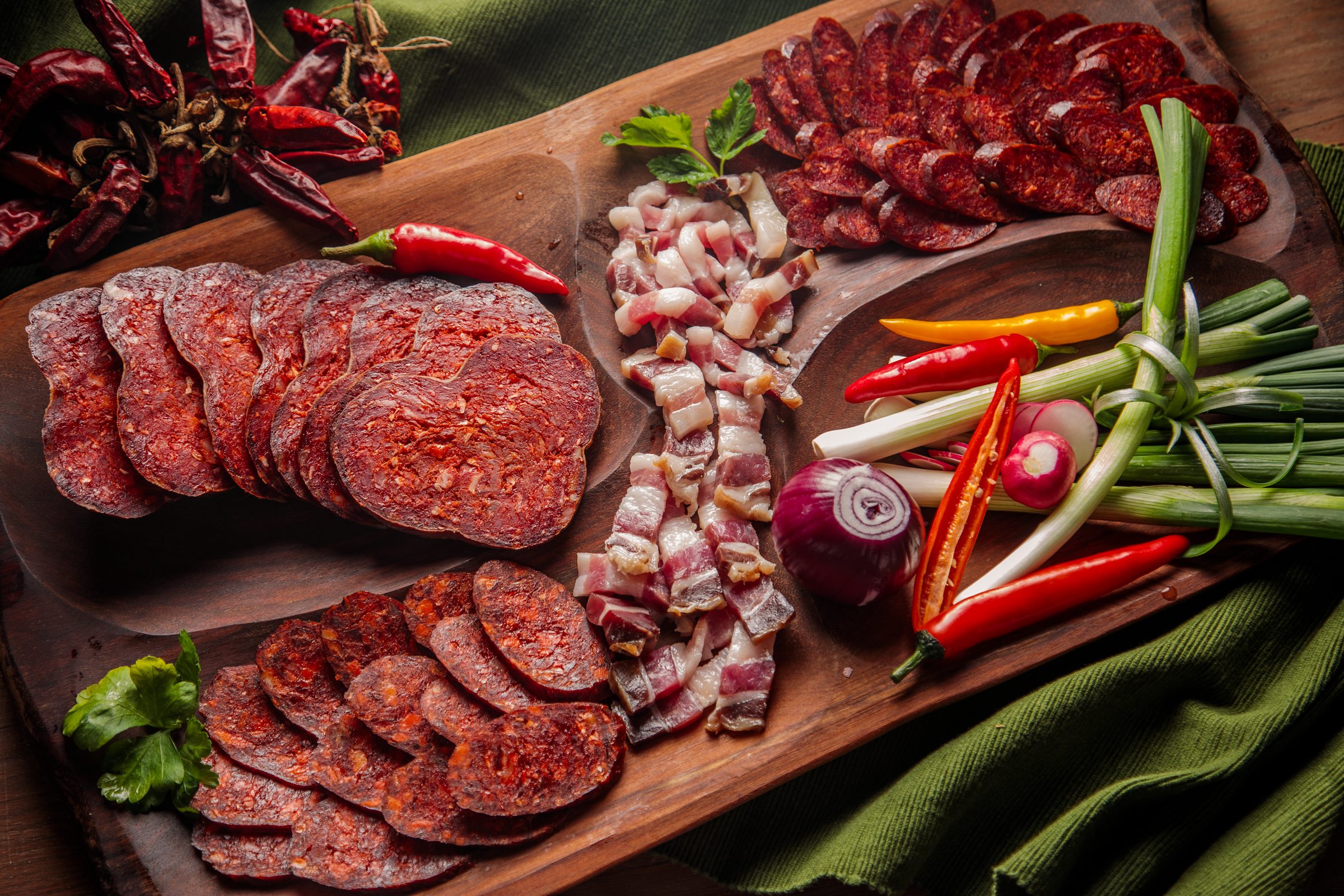 Baranja kulen, featured within a traditional Slavonian platter © Romulić & Stojčić
Baranja kulen, featured within a traditional Slavonian platter © Romulić & Stojčić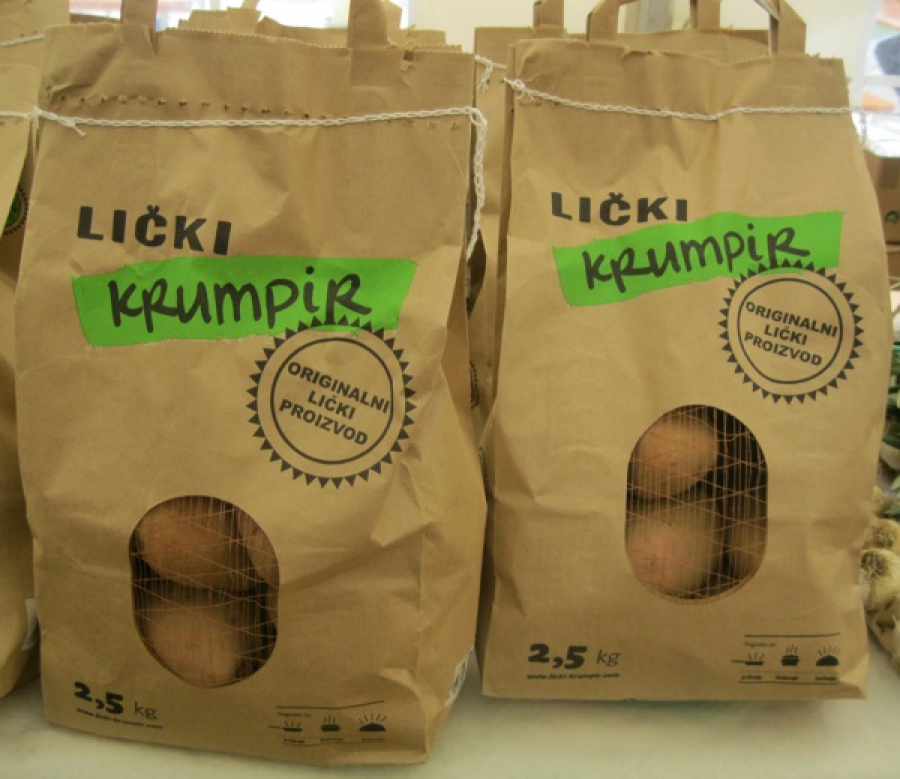 Lika Potatoes
Lika Potatoes
For the latest travel info, bookmark our main travel info article, which is updated daily.
Read the Croatian Travel Update in your language - now available in 24 languages
Pivac Group Opens Largest, Most Modern Prosciutto Factory in Croatia
As Novac writes on the 26th of May, 2020, Prime Minister Andrej Plenkovic, Minister of Agriculture Marija Vuckovic, MP Branko Bacic, Split-Dalmatia County Prefect Blazenko Boban and Vrgorac Mayor Ante Pranic recently visited the newly built meat production factory belonging to the Pivac Group in the Ravca business zone, which is located close to Vrgorac.
After visiting the Pivac Group's new factory, a meeting was held with Ivica Pivac, President of the management board of Braca Pivac, as well as Neven Pivac and Miljenko Pivac, who serve as members of the management board of the same company.
"I'd like to thank Mr. Ivica Pivac who presented this new factory, the largest prosciutto factory in this part of Europe. This marks a great investment near Vrgorac and one of the ways in which the Pivac Group, which operates in both Karlovac and Cakovec is securing jobs here in the Dalmatian hinterland. It employs almost 4,500 people and this also includes the latest investment in Kras in Zagreb. I'm glad that this production was done in a way that reflects the technology of prosciutto production in this part of Croatia and in the way it's very well recognised and appreciated by many consumers.
I'd like to congratulate them on this and I'm glad that they have excellent cooperation with the Ministry of Agriculture, and we heard today their plans for additional plants that will be built here. I'm sure that we'll find a way for such projects to receive support both at the national level and through European Union funds,'' said Andrej Plenkovic.
For years, the Pivac Group has firmly held onto its enviable position as the leader in the production of prosciutto on the Croatian market. A huge investment worth more than 120 million kuna in the construction of this newly opened modern prosciutto factory covering a 10,500 square metre area with a total capacity of 4,500 tonnes will push it even further forward, expanding Dalmatia's prosciutto production capacity along with it.
"The capacity of the new prosciutto factory, the largest not only in Croatia but also in the whole of Southeast Europe, is over 300,000 pieces of prosciutto and 2,500 tons of pancetta. In addition to increasing our production capacities, the new prosciutto factory will enable the Pivac Group to better position itself on the market, and in the long run, it will see it take a more significant step towards the European market,'' said Ivica Pivac.
"Since Dalmatian prosciutto is protected by a geographical indication (GI), it was crucial to preserve the traditional production conditions that are its most important characteristic. This means that all of the key elements of its production remain unchanged - salting it with sea salt obtained from Croatian salt pans, drying it in the Dalmatian bura wind and so on. It is precisely the traditional production conditions that guarantee the retention of the maximum taste and the aromatic properties of Dalmatian prosciutto ", explained the production director, Darko Markotic.
The production process will be carried out according to the highest standards, according to the specification of the protection of geographical indications and also in full accordance with the international standards of food quality and safety.
With the construction of the new prosciutto factory, the Pivac Group has completed the investment cycle that began with the project of expanding cooperation with Croatian pig breeders and investing in primary slaughterhouse processing, ie the expansion and modernisation of the slaughterhouse in Cakovec.
"These projects have enabled the maximum use of domestic raw materials in the Pivac Group as a whole, which, in addition to the entire range, also refers to the production of Dalmatian prosciutto and other durable cured meat products. By continuing to invest in production capacities and maximise the use of Croatian raw materials, we'll continue to strive to work for the benefit of the domestic economy and for rural development,'' said Ivica Pivac.
For more, follow Made in Croatia.
Potential for Croatian Producers as Prosciutto Exports Continue to Grow
As Morski writes on the 3rd of April, 2019, what has been happening with prosciutto for the past three to four years is truly spectacular. Due to its superior properties and specific traditional production technology, Croatian prosciutto producers have stumbled upon some great export potential and even more potential for the product's better placement in Croatian tourism through the country's already rich gastronomic offer.
When compared to five years ago in 2014, exports have increased in quantity by fourteen times, and perhaps most importantly, in value eleven times. Approximately 88 percent of total exports go to the EU market, and just over eleven percent go to CEFTA countries.
''The latest 2018 statistics show an increase in exports of shank and aitchbone products by nearly sixty percent, but unfortunately, we still don't even cover a third of imports. We need new investments and we need to invest in new prosciutto production capacities to double our production, and 700,000 pieces annually to at least meet the needs of the domestic market,'' said Dragan Kovačević, vice president of the Croatian Chamber of Economy for Agriculture and Tourism, at a press conference announcing the event Days of Croatian Prosciutto.
Ante Madir, Executive Director of the "Hrvatsko pršuta" (Croatian prosciutto) cluster, which brings together producers responsible for 95 percent of the total prosciutto production in the Republic of Croatia, explained more precisely what awaits Croatia on the fifth Days of Croatian prosciutto, which is being held from the 26th to the 27th of April at the Zagreb International Hotel this year.
''On the first day, we'll have a manifestation with round tables and workshops, the expert part of the gathering, and the second day at Ban Jelačić Square, there'll be a show-selling part where people can taste our prosciutto,'' Madir said, adding that they decided on Zagreb because quite a large market and a high demand for the product can be found in the Croatian capital.
"What's been happening with prosciutto over the past three to four years is truly spectacular. The signs of protection (special labels) are our tickets to the wider European Union market, that's very important for being able to [have our products] arrive to shop shelves. In Croatia, we still need to work on presenting [our products] to consumers to have them pay more money for something which is domestic and specific,'' said Igor Miljak, chairman of the PPK Karlovac meat industry, stressing that Croatia still doesn't have key gastro brands that are recognised on the European or global market, but it definitely does have the quality to be able to cope well with the competition.
Ana Babić from Voštane pršut, a representative of the Association of Dalmatian Prosciutto, explained the difference between Dalmatian and Istrian, or more specifically Krk prosciutto.
''Dalmatian prosciutto is smoked, while Istrian and Krk prosciutto isn't. There are no additives or preservatives in its production, and the process itself lasts for at least a year,'' Babić explained, adding that the tradition of Dalmatian prosciutto production draws its roots from as far back as ancient Roman times.
Drago Pletikosa of Belcrotrade and the president of the Association of Drniš pršut stressed that Drniš prosciutto is a little and is therefore certified, although there is no difference between Drniš and Dalmatian prosciutto when it comes to the production process itself.
''Last year, we imported 3,848 tons of products worth more than 21.5 million euros and exported 1.113 tons (6.5 million euros). Compared to 2014, exports have increased in quantity fourteen times, and by value eleven times. Approximately 88 percent of our total exports go to the EU market, and just over eleven percent go to CEFTA countries. We export the most to Slovenia (35.5 percent of total exports) and to Italy (28.1 percent),'' stated Pletikosa.
''This event brings together and promotes prosciutto producers from all over the country, whose products are protected by a stamp of designation of origin, and labels of geographical origin (Krk, Dalmatian and Drniš prosciutto) at the EU level,'' stated the Croatian Chamber of Commerce (HGK).
Quality labels for consumers guarantee the purchase of authentic and properly controlled products, with recognised quality and a local origin. Protecting products without educating consumers and business partners about its proper valuation has no great benefit. Therefore, this event contributes to the strengthening of the recognisability of these Croatian meat products with higher added value and a better market positioning, all with the aim of developing the wider Croatian economy.
Make sure to follow our dedicated business and Made in Croatia pages for much more.
Prosciutto in Support of Health - The 4th Promina Trail in Drniš
Feeling hungry but don't want to pay the physical price? Head to Drniš.
In Vrgorac: A Day of Dalmatian Ham & Wine
The first "Days of Dalmatian Smoked Ham and Wine" was held over the weekend in the country paths next to Vrgorac. The event took place over 3 days, with domestic prosciutto and wines from around Croatia.
Pršut Champion from Dugopolje - What is His Secret?
The International Pršut (Prosciutto) Festival in Drniš took place for the 2nd time last weekend. Many producers and pršut lovers gathered to taste and decide which one is the best of all.
The Dugopolje Pršut maker Vlade Prančić from the "Smijeli" pršutana (Pršut producing business) won the Champion title in the category of certified smoked pršut. To Vlade, it is his second victory after winning the same category last year.
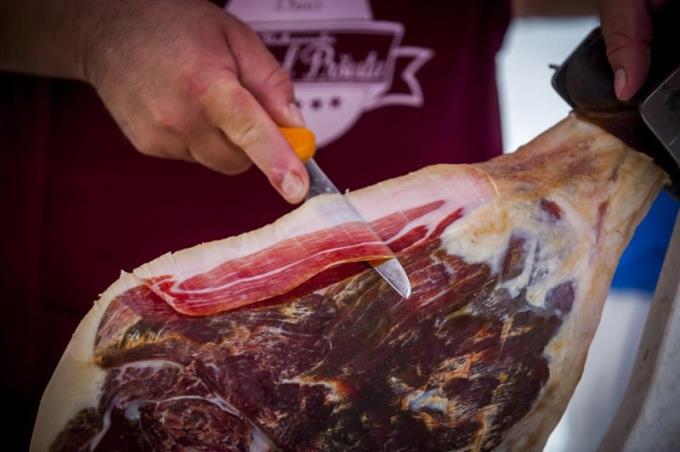
(photo: Slobodna Dalmacija)
According to Slobodna Dalmacija when askied Vlade about his secret in pršut making: " There is no secret ingredient, nor there is too much to think about. All of them who think too much have no pršut", says Vlade.
According to another producer, there are simple rules to follow when making a good pršut: "The most important thing is the age of the animal (must be a year old) and its weight (200-300 kg) and the breed needs to be Landrance or Yorkshire. Pršut need to get salted for two weeks and then smoked for 2 months. It will be at its finest after 2 years, best served with a glass of wine."
Read the whole article here.
Drniš Prosciutto – Another Croatian Product Registered at the EU Level
The secret of Drniš Prosciutto is getting out.


